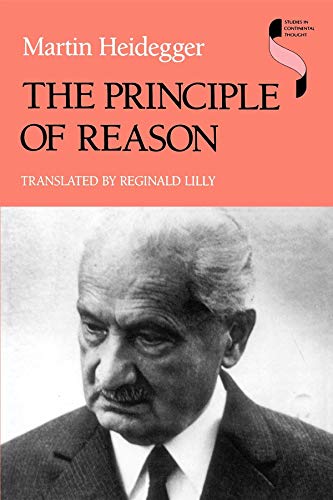The Principle of Reason (Studies in Continental Thought)
Martin Heidegger
BOOK REVIEW

In the labyrinthine corridors of philosophy, few figures are as polarizing and transformative as Martin Heidegger. His seminal work, The Principle of Reason, detonates into the realm of Continental thought like a philosophical firecracker. It's not merely a collection of ideas; it's an invitation to question the very essence of existence, reason, and the fabric of our reality. Heidegger, a titan of existentialism and phenomenology, compels you to dive deeply into the murky waters of thought where reason isn't merely a tool, but a profound inquiry into being itself.
What makes this exploration particularly electrifying is how Heidegger wrestles with the concept of reason. He pushes you to reevaluate everything you believe about logic and rationality, positioning both as paradoxes rather than pillars. Heavily borrowing from ancient Greek philosophy, he redefines the parameters, delving into how our understanding of the world is shaped and often limited by our preconceptions. Here, reason is not the bastion of truth but a labyrinth we navigate-even as it constantly shifts beneath our feet.
Critics have long debated the dense, challenging prose that Heidegger embraces so fully. Some readers, awed by his intellectual prowess, find their own interpretations caught in the web of his intricate arguments. Others, frustrated and overwhelmed, mourn the loss of clarity. Yet therein lies the beauty of The Principle of Reason: it is not meant to provide easy answers. Rather, it embraces ambiguity, urging you to wrestle with discomfort as a necessary step toward understanding.
Reflecting on the broader context of Heidegger's thought, we must consider the post-World War II era, where philosophy grappled with moral crises and existential despair. His work forces you to confront the shadows of history and personal experience. The world was not just a stage; it was a chaotic confluence of realities, perceptions, and emotions-a living testament to the idea that the human condition is steeped in uncertainty.
As you traverse Heidegger's arguments, you may find echoes of modern dilemmas around technology, existential dread, and the nature of connection. The digital age, rife with artificial intelligence and fast-paced algorithms, is a perfect landscape that reflects the tensions he so keenly philosophizes. What does reason mean in a world of data and machines? Are we still the masters of our fate, or have we surrendered to the narratives dictated by our creations?
Dive into the reactions of readers who've engaged with this enigmatic text-some recall transformative moments, where a phrase or a concept ignited a fire within them, while others hit a wall, struggling with Heidegger's philosophical lexicon. These polarized experiences only underscore the potency of his ideas. Love him or hate him, Heidegger leaves a mark that compels you to reckon with your own understanding of life.
What's undeniable is this: The Principle of Reason is an intellectual odyssey that demands your attention. It teeters on the brink of chaos and clarity, resonating deeply with anyone seeking to peel back the layers of human understanding. With each page, you are not just reading; you are engaging in a fierce dialogue with one of the most influential thinkers of the 20th century.
To sidestep this philosophical exploration is to remain squarely within the boundaries of comfort-but isn't life richer when we embrace the unfamiliar? Give yourself the audacity to embark on this journey. Your perspective may just shatter the conventions you've held dear, igniting a renaissance in your understanding of existence. 🌌
📖 The Principle of Reason (Studies in Continental Thought)
✍ by Martin Heidegger
🧾 176 pages
1996
#principle #reason #studies #continental #thought #martin #heidegger #MartinHeidegger